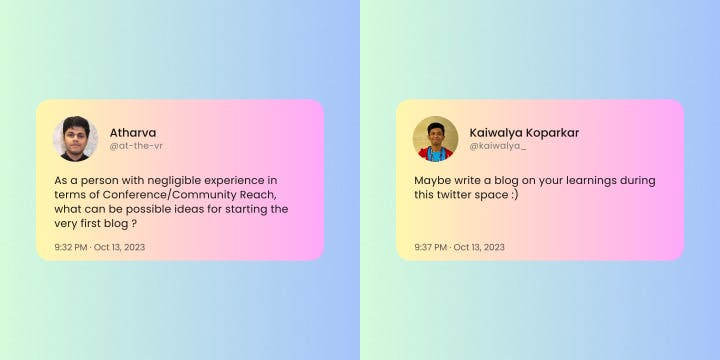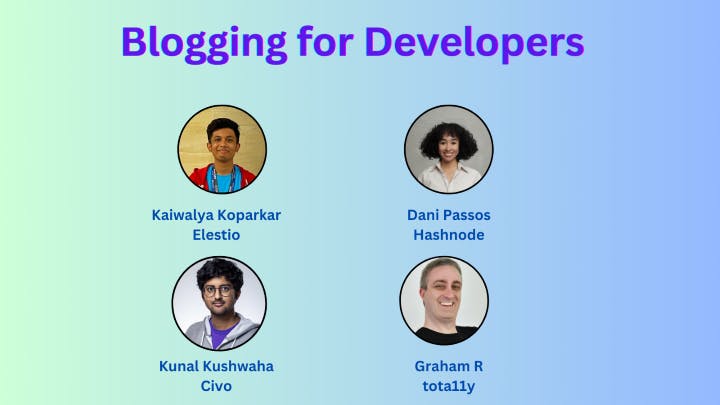Table of contents
- Objective
- Preface
- Question 1 (Overcoming Writer Roadblock)
- Question 2 (Benefits of Blogging)
- Question 3 (Choose Blogging Platform)
- Question 4 (Topic Relevance and Audience)
- Question 5 (Blog Promotion)
- Question 6 (Creator Burnout Remedies)
- Question 7 (Creativity in Blogging)
- Question 8 (Topic Selection/ Word Length/ References)
- Communities to join
- TLDR
Objective
To address common challenges every Writer is subjected to deal with when they start their Blogging Journey and the actionable steps they should perform to overcome those. That being said the audience this post engages is primarily in the field of Technology, but the advice from this post can be applied in different sectors as well.
Preface
The content that this Blog post is utilizing comes from a Q&A-based X Space hosted by Kaiwalya Koparkar (Developer Advocate @Elestio ) and Kunal Kushwaha (Devrel Manager @CivoCloud) titled "Blogging for Developers". From the Speaker's side, Dani Passos (Devrel Lead @Hashnode) and Graham R (Creator of tota11y.dev) cured all the queries.

The image above is one of the reasons for me to write this Blog Post. So without further ado, let's jump in the Q&A.
Question 1 (Overcoming Writer Roadblock)
Kaiwalya: Many Developers hesitate to start a blog as they don't have enough to talk about. How should one overcome this initial writer's roadblock and find their voice?
Dani: A piece of advice that is also part of the Hashnode Community is Just start writing, putting down ideas, and creating drafts which can include tips based on what you know, no matter how trivial the topic might be, it can be beneficial to someone else.
Dani: The act of writing itself can often generate new ideas for projects, and provide you collaborations with writers from different communities. The quality will improve over time as you and your blog grow. Rehearsing what you publish and the feedback you receive from the community will make sure your improvement is kept on track.
Question 2 (Benefits of Blogging)
Kailwalya: What are the key benefits of blogging as a Developer? Moreso, how has blogging impacted your career or knowledge sharing in the Tech Community?
Dani: Sharing your knowledge on what you just learned through a blog post to a broad tech community ends up solidifying your knowledge as you tell someone else how to do but also you learn the same concept twice. As a documentation proof, you also demonstrate that you have knowledge about the topic and this can help to stand out in Job Interviews or even Freelance Jobs.
Dani: Gradually this transforms from just blogging into Networking as you engage with like-minded folks on the Internet, connect with them and eventually deep dive into a community that wants to learn just as much as you do.
Dani: Personally for me as a DevRel, Blogging helped me to create better content, and get feedback from the community and folks who enjoy reading my blog posts. This also helps me in my Journey where I am building different side-projects or trying to monetize my content and even build a community.
Question 3 (Choose Blogging Platform)
Kailwalya: Do you have any recommendations for popular blogging platforms that you would recommend to anyone starting new?
Dani: Hashnode all the way. We have a community fully focused on Tech. We are always looking out for good content, tutorials and resources to learn. You receive complete Markdown support, you can have your custom domain for your Blog.
Dani: With the recent launch of Hashnode AI and Hashnode Pro, you as a Writer can craft compelling content for your blogs with ease. Fine-tuning every single aspect of your Blog post comes in-built with Hashnode Pro helping you publish your blog post much faster and better than originally crafted.
Question 4 (Topic Relevance and Audience)
Kailwaya: How do you decide on topics for your blog posts? What are the strategies you use to stay relevant and address your audience's needs at the same time?
Dani: There are 3 approaches I can summarize here. First, I write based on what I am learning or building at that particular moment. For example: I am building a developer feed app that lets you interact with other developers, and share knowledge and projects in a fun way. That means I am building this project and alongside that, I am also writing a blog post telling developers in my community about the process of building that Application and what Technologies I am using alongside the process of troubleshooting a variety of bugs I encounter.
Dani: Secondly, I keep a close look at X Trends. Various Technological advancements have taken place in the past few months which gain popularity from X itself. That proposes opportunities for developers to write and share about be it tutorials, pros and cons and how that can increase your productivity as a Developer.
Dani: Additionally, I tend to run surveys in communities together with Discord and Hashnode. This brings me any key information, gaps between existing content, and recent trends and eventually tailors all the posts that I am writing about.
Question 5 (Blog Promotion)
Kailwalya: What are the strategies specifically you take to build your audience for your blogging platform? How do you promote your blogs and attract readers within the developer community to read your blog?
Dani: First of all, all Developers who are writing blog posts and sharing knowledge should build a space or community even if it's small at first but interacting, sharing feedback and keeping track of what they post. I promote blog posts in different discord communities that I am part of.
Dani: As someone who is starring out, definitely join the Hashnode or WeMakeDevs Discord Community. You can share your articles there and also engage with folks who are willing to give you feedback in any form be it technical, typography and more. This creates a feedback loop between you the Writer and the community as Readers helping you improve your Blog Quality over time.
Dani: You are also encouraged to use Hashtags in your blog posts so that folks with similar interests can find and read your articles way faster. Hashnode Discussions are also a great way for you to find interests. What type of knowledge do you have that you want to share with them? Follow them, read their blogs, and leave your feedback under them so it's Bi-directional. In recent few years, X(formally Twitter) has also become a solid platform for sharing your insights in the form of articles or Threads, so that's also something you should keep in mind for your next Blog.
Question 6 (Creator Burnout Remedies)
Siddhant: As a creator, How should one deal with Creator Burnout which may result in poor quality of blog posts?
Graham: If you found that your quality of blogs is reducing because you are losing the drive, Odds are you have been overdoing it in the first place. Step 1 to avoid it would be to set lower expectations on your blog posts. If you think that you will produce 5 blog posts and 3 videos in 1 week, chances are you are not gonna be able to manage it.
Graham: Step 2 is to have an achievable target at first. Say for example: I will produce 1 article a week. You continue with this target till you feel that you are in the zone and then you can move to 2 and gradually more later down the road.
Graham: The other way that I can think of creator burnout can be that you ran out of ideas. The easiest thing to do in such a case would be to start thinking of a series. Get a reasonably large topic and go right into it. Say for example you have an interest in the Javascript Ecosystem. Check out MDN Web Docs, the content for Javascript there will be vast enough for you to learn and write articles about which can form a complete series.
Dani: Something important for you during a creator burnout is to take a step back and take a break. Anyone can think of taking a few days off and that will bring their productivity back. Finding communities where developers write and share content is also a good step as not only do you network with folks but you can talk about what you are going through alongside reading their articles, share insights and reevaluate your goals.
Dani: During a month, try to downscale the amount of content that you are pushing out. Additionally, you can mix up the format for your content. Videos, Tweets, Long-form content, and Podcasts are really good examples of a little change to inspire you and get a different taste from your Community.
Question 7 (Creativity in Blogging)
Muneeb: For someone who is a beginner in blogging, what should be their approach to writing stuff that most people have already written? How do you research those because there are already a lot of articles on the Internet? Additionally, how do you make your content interesting or creative to engage folks?
Dani: This is a struggle many creators not just technical writers face. Even though there are a lot of blog posts or technical content about your particular topic of choice, no one will take the exact personal view that you have around the same. That includes your tone, and your voice and sharing your insights about what you have learned, explored or developed which you should share with your community.
Dani: Make sure that the person who's reading your content is walking away with something useful and learns something based on your perspective that you use to create that content. Whenever possible, I also like to provide demos, GitHub Repos or any form of interactive example to reinforce what my readers just consumed in that blog post.
Graham: There is nothing new under the sun, You can always find Articles and documentation based on the topic you chose to write about. The count can be 50, maybe more but as you keep writing, people understand you, and they get your tone. They get interested in your content and start following you. They read to seek information and in doing so support you and that's what matters.
Graham: For each content that you write, there are 10,000 potential developers new to the field and your content will act as a starting point for them and that should be your focus.
Question 8 (Topic Selection/ Word Length/ References)
Ankur: This is a Three parter. First, how to choose a good topic? Second, how many words in a blog make it good? Third, how many references do we have to go through before starting to write a blog?
Dani: What is important for you to write Blogs is the topics should align with your interests, and what you are learning and building on top of. That in itself makes it inherently good for you. Secondly, you should understand what the community is trying to learn, and what their interests are. Additionally, you should read what other developers are writing about to understand the buzz.
Dani: You can find questions on platforms like StackOverflow or Hashnode as well to see what topics are not been written about much. A variety of newsletters like GitHub and Hashnode can help you discover what topics are currently in the spotlight. Building projects, learning languages, and experimenting with text tags can be part of your personal experience which you can always share.
Dani: For word lengths, there are 3 different types on any platform. Short-form posts (400-800 words) are good for diving into specific topics that are quick and easy to read as well as to write. There are Medium-form posts (800-1500 words) which are a very good balance. You have room for going in-depth on a particular topic but your readers won't feel overwhelmed with the content of your Article.
Dani: There are also Long-form posts (~2000 words) which are ideal for writing educational guides, giving a deep dive into a complex topic, subjective to the writer's knowledge around a certain topic or particular tech stack they chose to use.
Dani: When you don't know where to start looking for references, Hashnode Rix can be a helpful ally for you. When going super technical in specialized topics, I do recommend having at least 5-10 references including documentation, scientific research papers or GitHub Repos for the Projects.
Graham: Answering the first two parts, you have to first and foremost question yourself. What is my goal when writing this Article? Is it to gain an audience and grow, are you building a close community of like-minded fellows sharing similar niches as you do? Based on this your topics will vary.
Graham: For the third part, try to focus on Have I provided everything in this article that I need to? That will comfort your readers with all the information they seek. Removing fluff and filler is an important process in this stage. Most readers won't read your Articles all the way through, so as a Writer you have to get rid of all the filler texts to give a compact engaging Article for your readers.
Finally, we had closing notes from Kaiwalya, Dani and Graham.
Communities to join
TLDR
Just write your first Blog post. Promote it on Different Social Media.
Receive constructive feedback and act on it with your next blog post.
Blogging solidifies your understanding of the topic. Do it responsibly.
Check X Trends and Hashnode for understanding hot topics to read/write about.
In a creator burnout, slow down the pace and reevaluate your goals. Try different approaches for showcasing your knowledge (Tweets, Videos/Shorts, and Blog Series are prime examples)
Make sure your blog brings all the key points to the readers, doing so eliminates the dilemma of Word count.
References can start from 5 up to 10 based on the content size of the Blog post.


